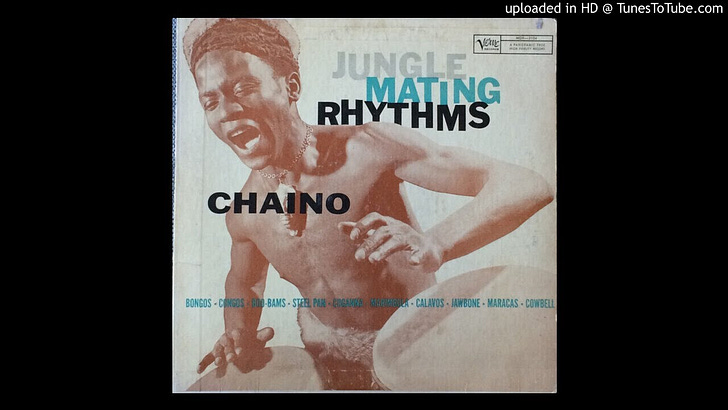Jungle Mating Call: The Mad Bongos of Chaino
By AllMusic's reckoning, Chaino (Leon Johnson) was a "Premier exotica-era percussionist, recording artist, and performer who was a master drummer and marketing visionary."
And now for something sort of completely different.
Exotica. The dictionary calls it "objects considered strange or interesting because they are out of the ordinary, especially because they originated in a distant foreign country."
Objects or people, such as Chaino, a maker of musical exotica who was alleged to have been the last survivor of a lost race from darkest central Africa.
The truth was a little more mundane. Chaino was Leon Richardson, born in Philadelphia, grew up in Chicago, and roamed a bit before making his way to Los Angeles. Where he released an album called Jungle Mating Rhythms, in 1958. Followed by a few more African-themed exotica albums.
Over at the Space Age Pop web site, where they specialize in this sort of thing, they note that there were two main strains of musical exotica - Tiki and Jungle, with the latter being "a Hollywood creation, with its roots in Tarzan movies (and further back, to W.H. Hudson's novel, Green Mansions."
They summarize the Chaino phenomenon as follows:
Chaino is one of the elusive figures of space age pop. After growing up in Chicago, Leon Johnson left home and lived a fairly wild life, eventually taking up the bongos and making a name for himself as "Chaino" (taken perhaps from the great Cuban conga player, Chano Pozo?) on the "chitlins" circuit of black nightclubs. In the late 1950s, he went to Hollywood and met producer Kirby Allan, who had recently been inspired by African tribal music during a trip to Kenya. Allan and Johnson went into the famed Gold Star studio in early 1958 to try to create an American-ized version. They eventually succeeded in getting jazz impresario Norman Granz to release some of these cuts on the luridly-titled, Jungle Mating Rhythms. At the same time, they were able to sell tracks to three different small West Coast jazz labels, Score, Tampa, and Omega, and all four albums were released virtually simultaneously. A few months later, Allan signed with the Silent Majority label, Dot (home to Lawrence Welk, for a fifth album, Africana. A sixth album, Temptation, was recorded for Omega but was barely out the door before the label went bankrupt.



Crazy, man!
Thanks for the story and the tip about this album, which I did not know. Another one for the Norman Granz file...Digging "Rico Tico De Dongo" - although it sounds like he's saying "Bongo." Go, Leon Johnson, go